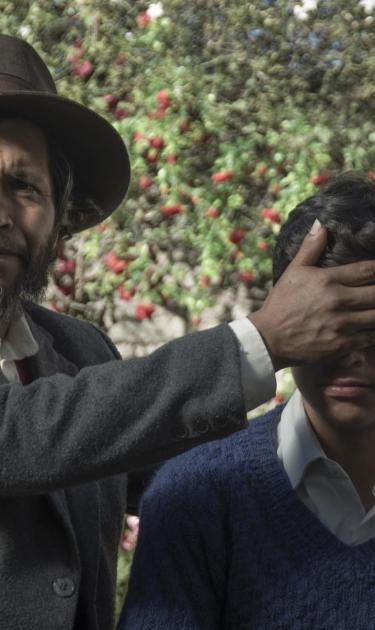Set in the picturesque Andes mountains, Retablo follows a moving father-son relationship in a tight-knit Quechua community. Segundo (Junior Béjar Roca) apprentices under the tutelage of his artisan father, Noé (Amiel Cayo), learning the delicate craft of handmade retablos — altar boxes with clay figurines modeled after members of the family, their likeness captured like an artistically rendered portrait. The 14-year-old is unabashedly proud of his dad and the way others in the area call him “the master.” However, on one long road trip, Segundo catches his dad in a sexual act with a man, causing him to question his strict religious upbringing. Their relationship suffers from the weight of their secrets, and eventually, Segundo must decide how to acknowledge the side of his father that goes against what their community believes. The tense family drama is Peru’s entry into the International Best Feature Film category for the 92nd Academy Awards.
Because of his age, Segundo wrestles with how to understand why his father would do such a thing. Although he and his friends talk openly about their crushes, he’s at a loss at what he perceives as his father’s betrayal. His pain is clearly apparent in scenes with his spirited mother, Anatolia (Magaly Solier), a supportive figure in both their lives who must contend with the Andes’ steep terrain with a limp. Segundo cannot find the words to tell her or even confront his father about the matter. Instead, emotions boil over and fists are thrown. He has yet to learn the language of grown-ups. Béjar Roca does an incredible job moving through Segundo’s many emotions, from the proud look he gives his father at the beginning to the many tearful scenes to come in the aftermath of their fallout. Although the movie is clearly about the father-son relationship, it is also a coming-of-age story for Segundo as well, as he must learn to stand up for what he wants to say and do about the matter.
Álvaro Delgado Aparicio’s feature debut is as lovingly crafted as the retablos featured in his movie. Many of the rooms are framed and staged to resemble the boxy altar pieces. The figures in the frame can look encased in their situations, frozen by emotion, outsized by the surrounding furniture and production details. The camera feels as if it were peering through the doors of the box, a retablo within a roomful of retablos, as is the case when Noé and Segundo are working in the shop. This makes all of the outdoor scenes within the village’s market and the rural landscape of the family’s home feel even more open and expansive. It’s a vividly beautiful place until it turns a cold, distant shoulder to Segundo’s family.
Álvaro Delgado Aparicio’s feature debut is as lovingly crafted as the retablos featured in his movie.
Cinematographer Mario Bassino’s cameras seem to delight in the bright colorful world of the indigenous community. There’s a lively green undertone in many of the houses and scenes set among the mountains that make Segundo’s world appear full of life and potential. When his father’s deed interrupts their close relationship, the color seems to dull a bit, he feels and looks a bit out of place with a slack jaw expression and empty eyes. Yet, the vivid threads of blankets and shawls, pop with every bit of blue, pink and green, the black hats sometimes trimmed with red along the brim, setting the women apart from the men, the celebratory spirit and the bleak somber tones of some of the movie’s lowliest moments.

The story, cowritten by Delgado Aparicio and Héctor Gálvez, and the editing by Eric Williams gives the movie a gentle pace. Segundo has a lot of time to shift through the remnants of his emotions, often accompanied by the sound of Harry Escott’s traditional-inspired string music. The movie boldly addresses homophobia in a way that’s not cloying but powerful as Segundo must confront his own prejudices before taking on the rest of his community’s. The result is a vibrant tableau that’s wonderful to appreciate and soak in but can feel painful to watch as a young man struggles to figure out his relationship to his father, who’s perhaps the most important figure of his young life. This journey is made easier by the beauty but it does not ease the sting of adolescent confusion.




